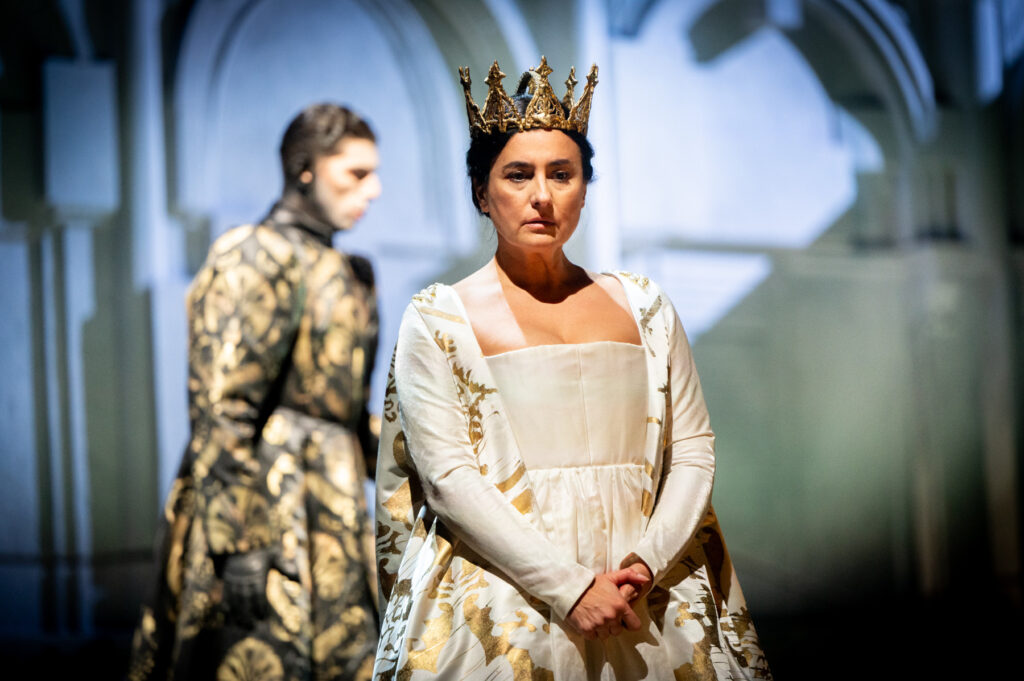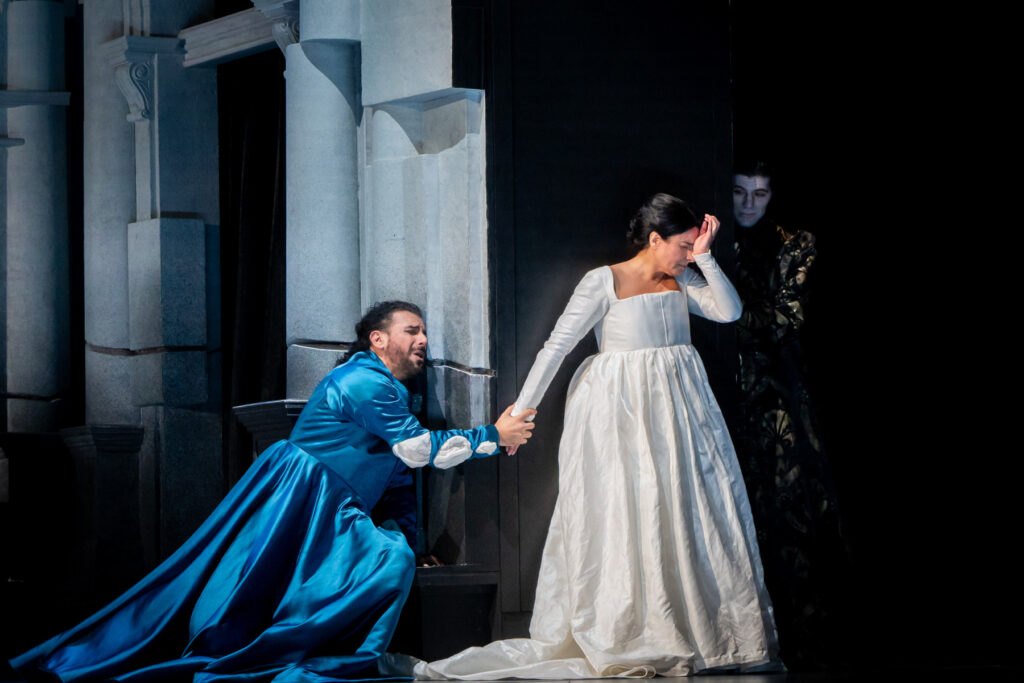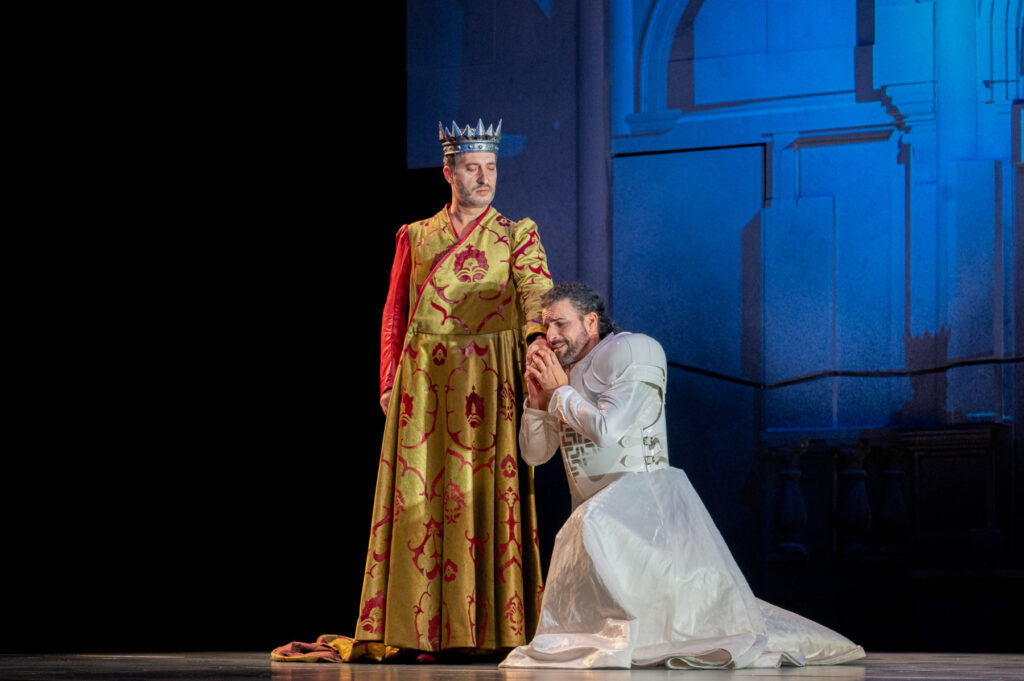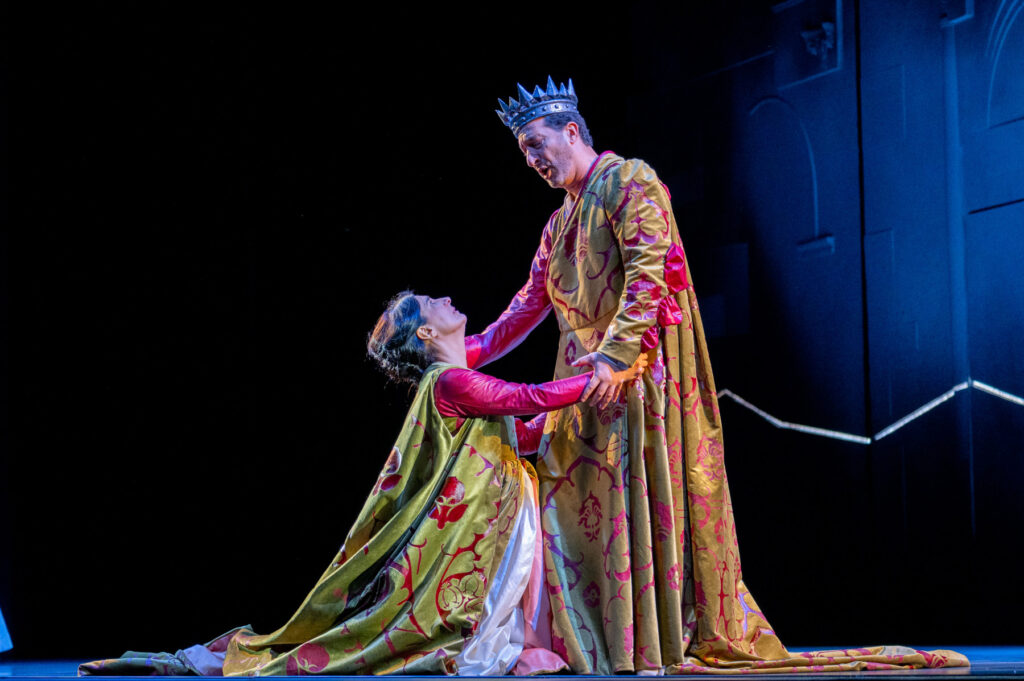Caterina Cornaro was a real figure in history, daughter of a Venetian nobleman who became Queen of Cyprus in the mid-15th century when the Republic was at the height of its power and prestige. She was effectively the pawn in a power game in which Venice sought to cement its control of the island by marrying her to its monarch (the historical James II, here Lusignano). Writers of historical epics never saw it as a problem if facts got in the way of a good story, and so the libretto from which Donizetti’s 1844 opera was derived modified events by having Caterina’s fictionalised prior love for Gerardo thwarted by the forced political match. They also simplified Venice’s machinations by having Lusignano’s fairly sudden death as caused by the Republic’s ambassador, Mocenigo’s poisoning of him once he was no longer useful, and telescoping events into a concise opera. The Donizetti Festival’s performance now is claimed to be the first to follow the composer’s original wishes by featuring the ending in which both Gerardo and Lusignano die, not just the latter, both victims of Venice’s warring schemes.

Just as the libretto adapted the past to suit the needs of a taut piece of theatre, the opera is fair game, then, for director Francesco Micheli to interpret what might be regarded as a costume drama of the 19th century in terms that can appeal to a contemporary audience on a more personal level. An opera set in, and about Venice – that city of myth and metaphor par excellence – invites imaginative interpretations of what it stands in for. And if we have come, since at least the time of Byron, to view Venice as a place of decay and death, then Micheli rings a valuable change in inverting that notion to see the Republic in an earlier era as an agent of death, when it was viewed with suspicion and fear by many other states for the wily political stratagems of its executive body, the Council of the Ten. Its group of emissaries here are sinister black-clad figures who slink around the stage like a spider. Although the opera was premiered in Naples, a performance in Donizetti’s birthplace of Bergamo even now is surely pregnant with historical memory, since the town was ruled by Venice for nearly four centuries, until that Republic’s downfall in 1797 (as it happens, also the year of the composer’s birth).
Micheli sets up an alternative drama in which a modern Caterina, newly married, is on honeymoon in Venice and discovers the story of her 15th century counterpart. Her husband suddenly falls ill and is taken to hospital, where his diagnosis proves to be problematic and ultimately terminal. During her anxious waiting at hospital, she thinks back to the resonances of the mediaeval story with her situation and imagines the possibility of a different life she may have had with a contemporary Gerardo rather than becoming a widow so soon.

In excising a good chunk of time, and particularly the period of Caterina’s marriage to the king, some confusions in the original opera are compounded in the directorial concept here. Despite textual projections, expressing the modern Caterina’s thoughts, it’s not clear initially that her mortally ill husband corresponds with Lusignano, rather than Gerardo whom her mediaeval avatar evidently loves more truly. Gerardo’s modern embodiment is the surgeon who attends to Lusignano which seems curious given that they are, understandably, at loggerheads in the mediaeval drama being played out. The programme explains this as a sort of fancy or flirtation by Caterina with the surgeon – dramaturg Alberto Mattioli cites the TV drama E.R. and the attraction of George Clooney’s character – taken by Enea Scala, who sings the role of Gerardo and is certainly a match for Clooney. Only later does his and Lusignano’s antagonism resolve itself in overcoming their differences and making common cause against their mutual enemy, Venice.
The correspondences between the historical pageant and the contemporary scenario are efficiently staged, with the set swinging around as needs be between the two, and the interface between them becoming more closely connected and frequently drawn. But the specific correspondences which Micheli evidently means to make are sometimes rather elusive or cryptic. The programme note ultimately explains them, but arguably a dramatic presentation should succeed on its own terms on the stage, appealing to intuition and emotion, rather than resorting to explanation or justification in an external source. It’s also curious that, in choosing to offer Donizetti’s alternative version of the conclusion, there is no follow up on what that means for Gerardo’s surgeon alter ego to fall out of the picture too, once he has unsuccessfully tried to operate on Lusignano. Be that as it may, that first version is wisely chosen for its heart-rending focus on Caterina’s tragic fate, having lost both men, in place of the more neutral revision where she is simply hailed as the sole, continuing ruler of Cyprus.

The vocal performances carefully delineate the characters and help to trace the outlines of the two concurrent dramas. Despite the stresses undergone by the two Caterina characters, Carmela Remigio maintains a solid musical presence, expressive with her rich vibrato but ultimately impressively unflinching. The two male leads are suitably contrasted: on one hand, by Scala’s bold, strenuous account of Gerardo, with considerable vocal strength even in the upper tenor range to convey the character’s determination; and on the other, by Vito Priante’s warmly sonorous and personable Lusignano.
Riccardo Fassi gives a quietly, insidiously gripping interpretation of the Venetian ambassador, Mocenigo, achieved through a sly, dark agility in the role’s bass lines. As Caterina’s father, Andrea, Fulvio Valenti has a more open, gravelly timbre expressive of a certain passivity as he accedes to the Council of the Ten’s demand that she marry the Cypriot king. Francesco Lucii brings some roguish levity as the Venetian henchman, Strozzi, and in this opera dominated by male voices, Vittoria Vimercati has a brief but decent look-in as the only other female character, Matilde.

Riccardo Frizza’s conducting of the score sustains a steady symphonic tension, sometimes even inscrutable, that is all the more powerful for the Donizetti Opera Orchestra’s comparative restraint in sonority. The Accademia Teatro alla Scala Chorus are sometimes too light, perhaps, but the climaxes which they and the orchestra reach arise naturally from the music’s momentum, not imposed with artificial force.
However imperfect the results on stage, Michaeli’s interpretation is certainly vindicated on the basis that it proves this opera to be one of some dramatic depth that can hold its own among Donizetti’s far more famous Tudor queens trilogy. Michaeli helpfully – sometimes provocatively – prompts us to consider how 19th century historicism may be interrogated and re-purposed to our modern preoccupations, and thereby salvage an underestimated operatic score.
Curtis Rogers
Caterina Cornaro
Composer: Gaetano Donizetti
Libretto: Giacomo Sacchero
Cast and production staff:
Caterina Cornaro – Carmela Remigio; Andrea Cornaro – Fulvio Valenti; Gerardo – Enea Scala; Lusignano – Vito Priante; Strozzi – Francesco Lucii; Mocenigo – Riccardo Fassi; A Knight of the King – Francesco Lucii; Matilde – Vittoria Vimercati
Director – Francesco Micheli; Set designer – Matteo Paoletti Franzato; Costume designer – Alessio Rosati; Lighting designer – Alessandro Andreoli; Dramaturg – Alberto Mattioli; Visual designer – Matteo Castiglioni; Conductor – Riccardo Frizza; Accademia Teatro alla Scala Chorus and Donizetti Opera Orchestra
Teatro Donizetti, Bergamo, Italy, Saturday 22 November 2025
All photos by Photo Studio U.V. – Courtesy Donizetti Opera – Fondazione Teatro Donizetti